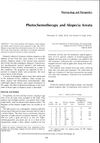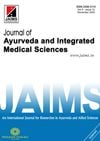
Search
for
Sort by
Research
30-60 / 359 results

research Psychological Characteristics of Alopecia Areata and Androgenetic Alopecia in Women
Women with alopecia often experience high levels of anxiety and depression, needing psychiatric help.

research Cross-Sex Hormone Therapy in Trans Persons Is Safe and Effective at Short-Term Follow-Up: Results from the European Network for the Investigation of Gender Incongruence
Hormone therapy for trans individuals is effective and generally safe in the short term.

research Dermatological Manifestations of Stress in Normal and Psychiatric Populations
Stress can worsen skin conditions and affect mental health, so doctors should include stress management in skin treatment.

research Unwanted Facial Hair: Effects and Solutions
Unwanted facial hair significantly impacts over 40% of women's psychological and social well-being, and various treatment options are available.

research New Lifestyle Drugs and Somatoform Disorders in Dermatology
The article concludes that dermatologists should prescribe lifestyle drugs carefully and consider mental health treatments for patients with disorders like BDD.

research Photochemotherapy and Alopecia Areata
Some people with severe hair loss saw hair regrowth after a specific light and drug treatment.

research Herbal Treatment for Dermatologic Disorders
Some herbal treatments are effective for skin disorders, but more research and regulation are needed.

research Highly Conserved Keratin-Associated Protein 7-1 Gene in Yak, Taurine, and Zebu Cattle
The KRTAP7-1 gene is very similar across different cattle and yak breeds and likely plays a role in hair strength and shape.

research Ayurvedic Management of Alopecia Areata: A Single Case Study
Ayurvedic treatments helped a 16-year-old regrow hair after modern medicine failed.

research Hair Growth Inhibition by Psychoemotional Stress: A Mouse Model for Neural Mechanisms in Hair Growth Control
Stress can stop hair growth in mice, and treatments can reverse this effect.

research Neuropharmacological Profile of Eclipta Alba (Linn.) Hassk
Eclipta alba extract improved learning, memory, and stress-related ulcers in rats without affecting movement or causing anxiety.

research Anagen Effluvium: A Review of Rapid Hair Loss During Growth Phase and Loose Anagen Hair Syndrome
Hair usually grows back 1-3 months after treatment for anagen effluvium, and children with Loose Anagen Hair Syndrome often improve by adolescence.

research Acne
Acne significantly affects mental health and quality of life, with research suggesting hormonal and genetic factors in its development and emphasizing early treatment to prevent scarring.

research Psychological Interventions in the Management of Common Skin Conditions
Using psychological treatments can help manage skin conditions along with regular medical care.

research Adult Skin Acute Stress Responses to Short-Term Environmental and Internal Aggression from Exposome Factors
Adult skin quickly reacts to short-term environmental and internal stress, leading to various skin issues and the need for protective measures.

research Examining the Relationship Between Alopecia Areata, Androgenetic Alopecia, and Emotional Intelligence
Alopecia patients struggle with emotions and stress, and improving emotional intelligence may help manage hair loss.

research Current Standards in the Diagnostics and Therapy of Hair Diseases - Hair Consultation
The document concludes that proper diagnosis and evidence-based treatments are crucial for managing hair diseases, and psychological support for patients is important.

research Reduced Serum Brain-Derived Neurotrophic Factor in Patients with First Onset Vitiligo
People with first-time vitiligo have lower levels of a certain brain protein compared to healthy individuals.

research Effects of the Selective TrkA Agonist Gambogic Amide on Pigmentation and Growth of Human Hair Follicles In Vitro
Gambogic Amide helps maintain hair color and promotes hair growth.

research Alopecia Areata: Hyperactivity of the Hypothalamic–Pituitary–Adrenal Axis Is a Myth?
The study found no significant difference in stress hormone levels between people with alopecia areata and healthy individuals, suggesting that the disease is not caused by an overactive stress response system.

research Update on Psychodermatological Disorders
Treating both the mind and skin together, especially by managing stress, can greatly improve outcomes for skin disorders linked to psychological issues.

research Alopecia Universalis Following Two Sequential Traffic Accidents: Possible Association with Increased Th1 and Th17 Cells and Decreased Th2 Cells
Autoimmune hair loss may be linked to increased Th1 and Th17 cells and decreased Th2 cells.

research Confirmatory Factor Analysis of the Causal Illness Attribution Scale in Chinese Patients with Multiple Somatic Symptoms
The two-factor model fits better for Chinese patients' understanding of illness causes than the original four-factor model.

research Illness and Femininity in Hilary Mantel’s Giving Up the Ghost
The document concludes that Hilary Mantel's memoir shows how childhood experiences affect adult health, criticizing modern medicine for ignoring the mental aspects of physical illness.

research Adequate Nutrition and Premature Hair Graying: A Review of Literature
Good nutrition may help prevent premature hair graying.

research Trichotillomania and Traction Alopecia
Hair pulling disorder is treated with therapy and medication; hair loss from tension can be reversed if caught early.

research Abstracts from the 17th Congress of the European Society for Dermatology and Psychiatry
The congress showed that psychological therapy can help skin condition patients, social media affects acne stigma, education improves atopic dermatitis, and patient satisfaction in dermatology is high, especially with good doctor engagement.

research Clinical Management in Psychodermatology
The document concludes that treating skin conditions should include psychological care and a multidisciplinary approach is essential for effective management.

research Third World Congress of the International Academy of Cosmetic Dermatology
The Third World Congress of the International Academy of Cosmetic Dermatology discussed various topics like hair disorders, skin conditions, wound healing, shampoo technology, acne treatment, and the use of lasers in dermatology.